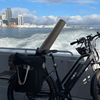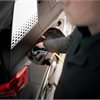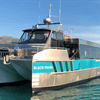CANBERRA'S e-bike library has been struggling to keep up with demand since it was launched last September.
The Canberra Times reports that 82% of those borrowing an e-bike for the two-week loan period say they’re now in the market for an e-bike with 37% buying one almost immediately.
In the Finnish city of Joensuu, a queue forms outside the central library each morning of people hoping to check out one of the three cargo bikes available for loan.
Dr Kirsty Wild, an environmental sociologist at the University of Auckland with an interest in sustainable transport, believes e-bike libraries could be a cost-effective way to encourage the uptake of cycling in New Zealand too.
The benefits to the climate and public health of more people cycling are well established. A recent study found that emissions from e-bikes were up to 10 times lower for each trip than electric cars, and 30 times lower than fossil fuel ones.
But despite impressive statistics like those, it’s EVs that are attracting government subsidies not e-bikes – which are by far the most popular electric vehicle in the country.
A
petition calling for government subsidies for bikes, e-bikes and protective gear has so far attracted more than 1000 signatures.
Dr Wild agrees the government needs to do more to encourage the uptake of cycling but isn’t convinced that a subsidy like the one being offered for EVs is the best option.
She says there needs to be a more nuanced approach than a simple subsidy.
For some people, cost isn’t the primary thing stopping them buying an e-bike, it’s not knowing whether they will use it. There’s a fear it will simply end up cluttering up the garage with that never used kayak or exercise machine.
E-bike libraries would provide people with an opportunity to gauge, over a week or two, whether e-bikes were a viable alternative to driving or taking public transport.
Another option is workplace fleets – so people can borrow an e-bike, or a standard bike, from their employer to try it out or use it for short work trips during the day.
Wild says work and safety concerns sometimes get in the way of companies buying e-bikes.
She says financial barriers are very real for low-income people and would support much steeper subsidies for people low incomes or benefits. Subsidised rental schemes that provide e-bike at very cheap rates could be an option.
Big cargo-style bikes are increasingly replacing the second car in many families but they’re prohibitively expensive – sometimes over $10,000 – so solutions that allow families to try them out would be helpful.
One of the problems with a straight subsidy system is that it’s likely to be set at a rate that is a nice to have for many – but not the deal breaker – and not enough to get the poor onto bikes.
“I wouldn’t want to see a scheme offering $300 or something like that,” Wild says.
An app that offers rewards
Kirsty Wild says there’s a whole range of other ways people could be encouraged to take up cycling.
In the Netherlands there's an app that cyclists with the likes of free coffees based on how many trips they made.
Probably the single most important thing is creating a network of safe cycle routes and then making sure people are aware of where they are.
In Europe cycle highways – high quality wide cycle routes between population centres - are increasingly being built. The uptake of e-bikes has seen the average distance travelled by cyclists doubling.
Wild says in New Zealand many of the cycleways being built are of low quality and not built with e-bikes – with their higher average speeds – in mind.
“Lots of people struggle finding safe route. A bit of support in first couple of weeks, make a lot of difference.”
The view from the shop floor
Dan Mikkelsen, the founder of Wellington’s Bicycle Junction, says a subsidy for bicycles would run into problems distinguishing between bikes that are primarily used for transport and those that are for recreation.
Subsidising the purchase of a $10,000 mountain bike that spends most of its time on the bike of double-cab ute might not be the best look, he says.
On the other hand bicycles and e-bikes provide far greater benefits than EVs. “EVs just lower the carbon footprint. E-bikes and bicycles have health benefits, and they ease congestion on the roads.”
Bicycle Junction specialises in bicycles that are primarily for transport. Since setting it up, a decade ago, Mikkelsen says there’s been massive growth in the number of families buying cargo-bikes.
He says families who buy the bikes typically replace between 30 to 70 percent of the car trips with bike trips.
A good quality cargo-bike costs upwards of $8000 - so, it's a big investment but with it often replacing a second car it can make good economic as well as environmental sense.
Mikkelsen says he first began importing the cargo bike out of passion rather than because it made any economic sense, but now they were a big part of the business. “There are lots of families for who it just absolutely changes the way they’re living. Kids love going to school on them.”
“There’s so much less wasted time behind the wheel. It makes life easier for a lot of people,” Mikkelsen says.
He says once people get an e-bike they realise it’s far easier and faster than getting around on a car.
Modern e-bikes with their fat tyres and powerful brakes made people feel far more confident about riding but the lack of separated cycleways remained a real deterrent to people taking up cycling.














